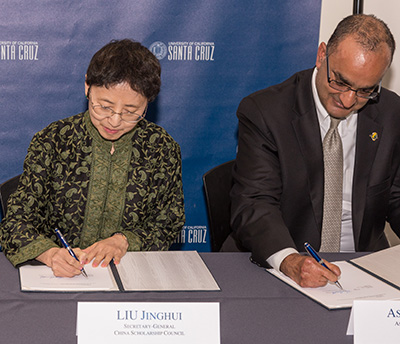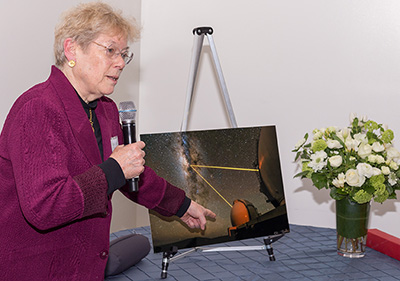Campus News
UCSC and Chinese officials sign agreement for Graduate Student Scholars Program
New program will bring top Chinese students to UC Santa Cruz for graduate studies in astronomy and astrophysics.



UC Santa Cruz and the China Scholarship Council (CSC) have agreed to establish a Graduate Student Scholars Program for Chinese students to pursue Ph.D. graduate studies in the Department of Astronomy and Astrophysics. A signing ceremony was held at UC Santa Cruz on March 28 during a visit to campus by CSC officials.
Students in the program will be jointly selected by CSC and UC Santa Cruz, and CSC will provide each scholar with full tuition and a stipend for their first two years. The China Scholarship Council provides support for a wide range of international exchange programs in the United States and Europe.
“There is genuine interest on both sides to promote international collaboration and scholarly exchanges. This agreement highlights the growing presence of UC Santa Cruz on the international stage,” said UCSC Chancellor George Blumenthal, who visited China in 2015 and met with academic leaders at several top Chinese universities.
Liu Jinghui, secretary-general of the China Scholarship Council and president of the China Association for International Education, said astronomy is an area in which China wants to cultivate high-level expertise. China is a partner in the international Thirty Meter Telescope project and is planning new astronomical observatories in China.
“That is why we want to partner with UC Santa Cruz in astronomy,” Liu said. “Astronomy is an important field for the whole world, and we are training young people not only for today but for the future.”
Sandra Faber, a professor emeritus of astronomy and astrophysics who helped facilitate the agreement, said it paves the way for other UC campuses to join the program, now that the terms of the agreement have been worked out in consultation with the UC Office of the President.
“Other UC campuses are now looking at our example and may join in the future, and the University of Hawaii is signing a similar agreement,” Faber said.
Prospective candidates for the program will apply first to the UCSC Ph.D. program in astronomy and astrophysics, and those who meet the department’s normal selection criteria will then apply to CSC for funding support.
The agreement covers an initial cohort of students starting in Fall 2017, and could lead to a long-term program in the future, as well as other scholarly exchange programs. If successful, the Graduate Student Scholars Program may expand beyond astronomy to include students in Earth sciences and other fields, Faber said. Additional exchange programs, involving CSC support for visiting scholars and postdoctoral researchers, are also under consideration.
According to Faber, the Thirty Meter Telescope (TMT) project was a major impetus for the new program. UC and China are partners in TMT, along with India, Japan, Canada, and the California Institute of Technology. UCSC astronomers involved in TMT have been traveling to China and establishing connections with Chinese institutions. Training Chinese students at UC Santa Cruz, where they can work with faculty and staff who are among the world’s leading experts on large telescopes, will ultimately benefit everyone involved in TMT, Faber said.
“Twenty years from now, when we are deep into the TMT collaboration, we will have forged strong connections and partnerships with Chinese scientists,” she said.
Faber also emphasized that bringing international students to UC campuses benefits both the university and the state. “It makes UC, and by extension the state of California, a player on the world stage,” she said. “If we want to train our students to function effectively in the world, we have to expose them to other cultures so they can gain a global perspective.”